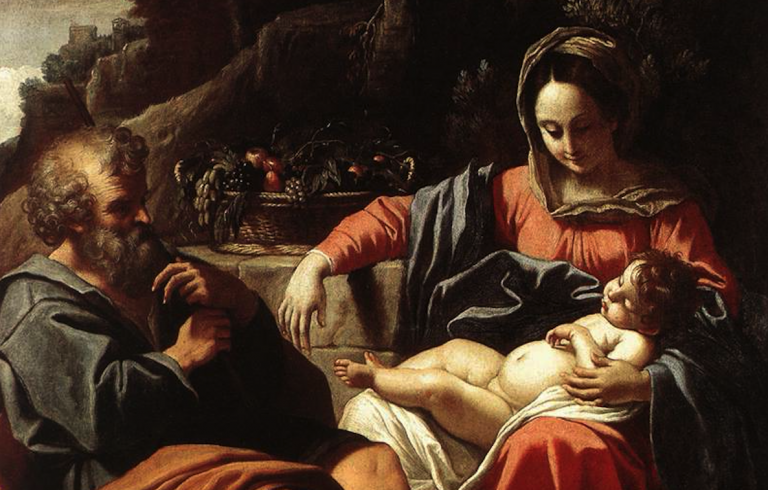By Mike and Gwen Sullivan
Mike and Gwen Sullivan are contributors to Scripture and the Mystery of the Family of God, part of the Catholic for a Reason series.

As parents of seven children, we often get the feeling that we are living on a different planet. People gawk at us when we are out in public. We routinely hear negative comments from strangers. Some of the comments include: “Are those all yours?”; “Don’t you have a television?”; or, our favorite, “You must be Mormons.” We’ve learned to laugh off such questions, but the fact that we hear them so often makes us realize just how far our society has gone in its outright opposition to the family.
This opposition to the family is especially disturbing, as the family has always formed the basic core around which communities are built. The family, according to Vatican II, is “the first and vital cell of society.”1 The Council also said that the well-being of individuals and even society “is closely bound up with the healthy state of conjugal and family life” (Gaudium et Spes 47).
So what is a family to do in today’s age when trying to live the Christian life is an affront to the secular society in which we live? This is a difficult question, but it is one that has been asked many times in many ages before ours. Think of the early Christians, living under Roman persecution, who clandestinely met for the sacraments in caves under the city. If they were discovered they’d surely be tortured, mutilated, or murdered. Consider also the plight of Catholics in many places during the Protestant Reformation when Mass was outlawed and Catholics were regularly imprisoned and murdered.
Throughout history, Catholics have struggled against the world. In these times, “the saints have always been the source and origin of renewal in the most difficult moments in the Church’s history” (CCC 828). The one guiding principle for families has always been to accept the challenge and respond to the world aggressively by striving for holiness.
What better example do we have as Christian families than to model our lives after the family par excellence, the Holy Family?
By reflecting on the roles of Mary as mother, Joseph as father, and Jesus as child, we can gain a spiritual perspective that continuously shapes our understanding of our roles in our own families. In our own family we’ve tried to reflect on these various roles of the Holy Family and we were blessed to find some helpful comments by Pope Paul VI.
Pope Paul VI called Nazareth the “model of what the family should be.” He went on to say that building a “community of love and sharing” is crucial to teaching children the virtues. It is also necessary to form within them the raw material for selfless, loving relationships with God and with their future spouse and children.
Building a community of love and sharing begins with each family member’s willingness to offer him or herself for the sake of another. We parents are called to be the first examples of this self-giving. In our home, we do our best to provide a good example of self-giving for the children. We have a chore list with jobs for each child. Sometimes, when the work is really difficult, we will all pitch in and help the child whose chore is especially daunting. The children learn from this example and the older children will often kick in and help their younger siblings to tie their shoes or tidy the bathroom.
But the self-giving we are called to is much more than just our work. The spirit in which our work is done is what is important. Our lives are to be ordered to the joyful service of others. Think of the self-giving of the Holy Family. Mary understood this. Consider how she dropped everything and traveled to visit her cousin Elizabeth. Even though she was pregnant herself, Mary willingly and happily went and served the needs of her elder cousin (see Luke 1:39–56).
Consider Mary’s role in suffering through her Divine Son’s torture and death on the Cross. She knew that she and her Son would have great sufferings to endure, but she humbly and loving embraced her call and remained at His side until His death.
Likewise, Saint Joseph offered an example of total self-surrender when he humbly accepted God’s will in leading his family out of danger into Egypt (see Matt 2:13–15). They would flee as refugees, in poverty. But it was God’s will. It was what they had to do to protect the Divine Child.
We as parents must be prepared to drop everything and flee in order to protect our family. This applies not only to bodily protection, but most importantly to the protection of our souls. When we perceive a threat to the moral life of our family, we must flee from that threat or root it out of our homes. If we wish to build a community of love and sharing, we must first look after those in our charge and provide a protective environment in which they might develop.













